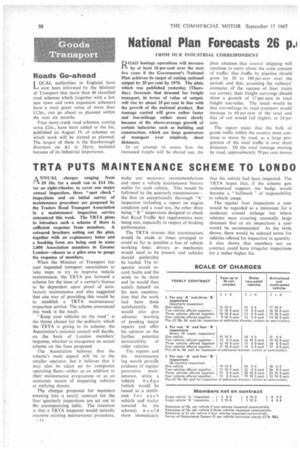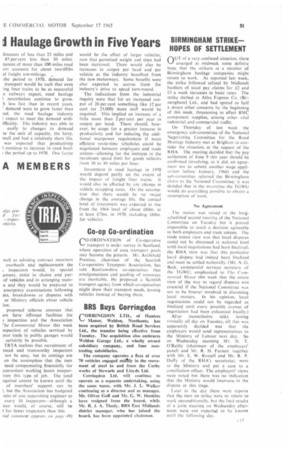TRTA PUTS MAINTENANCE SCHEME TO LONDO A MEMBERS
Page 52

Page 53

If you've noticed an error in this article please click here to report it so we can fix it.
ANNUAL charges ranging from 19 10s. for a small van to f14 10s. For an eight-wheeler, to cover one major annual inspection, three "spot check" inspections and an initial survey of maintenance procedure are proposed by the Traders Road Transport Association in a maintenance inspection service announced this week. The TRTA plans to introduce such a scheme if there is sufficient response from members. A coloured brochure setting out the plan, together with an explanatory letter and a booking form are being sent to some 2,000 Association members in Greater London—chosen as a pilot area to gauge the response of members.
When the Minister of Transport last year requested transport associations to take steps to try to improve vehicle maintenance, the TRTA put forward a scheme for the issue of a carrier's licence to be dependent upon proof of satisfactory maintenance and also suggested that one way of providing this would be to establish a TRTA maintenance/ inspection service. The scheme announced this week is the result.
"Keep your vehicles on the road" is the theme chosen for the publicity which the TRTA is giving to its scheme; the Association's national council will decide. on the basis of London members' response, whether to inaugurate an actual scheme on the lines proposed.
The Association believes that the scheme's main appeal will he to the smaller operator, but it believes that it may also be taken up by companies operating fleets—either as an addition to their maintenance programme or as an economic means of inspecting vehicles at outlying depots.
The charges proposed for members entering into a yearly contract for the four quarterly inspections are set out in the accompanying table. The intention is that a TRTA inspector would initially examine existing maintenance procedure.
l4
make any necessary recommendations and open a vehicle maintenance history wallet for each vehicle. This would he followed by the quarterly examinations— the first an exceptionally thorough "A" inspection including a report on engine condition and a road test, the other three being " B " inspections designed to check that Road Traffic Act requirements were being met, especially in respect of braking performance.
The TRTA stresses that examinations would be made at times arranged to avoid so far as possible a foss of vehicle working time; drivers or mechanics would need to be present and vehicles should preferably be loaded. The inspector would re cord faults and the work to be done and he would then satisfy himself on his next examination that the work had been done satisfactorily. He would also give advance warning of pending major repairs and offer his opinion on the further potential serviceability of older vehicles.
The reports and the maintenance log would provide evidence of regular preventive maintenance, while a vehicle badge (which would be issued as a certificate for each vehicle and trailer covered by the scheme) would show immediately that the vehicle had been inspected. The TRTA hopes that. if the scheme gets widespread support. the badge would become a " hallmark " of responsibility in vehicle usage.
The regular four inspections a year would be regarded as a minimum for a moderate annual mileage but where vehicles were covering unusually large distances five or six inspections a year would be recommended. As the table shows, there would be reduced terms for vehicles offered for inspection in quantity. It also shows that members not on contract could have irregular inspections for a rather higher fee, well as advising contract members overhauls and replacements the inspectors would, by special tement, assist in choice and purof vehicles and in arranging main:e and they would he prepared to emergency examinations following nts, breakdowns or disputes with or Ministry officials about vehicle ion.
proposed scheme assumes that ers have bffstreet facilities for
inspection and the Association 'he Commercial Motor this week nspection of vehicles serviced by otor trade in public garages would : certainly be possible.
TRTA realizes that recruitment of !need and trustworthy inspectors not be easy, but its costings are on the assumption that the men need compensating financially for convenient working hours insepar'min this type of job. The total equired cannot he known until the
of members' support can be I, but the Association has budgeted .atio of one supervising engineer to every 10 inspectors—although a isor would, of course, still be I for fewer inspectors than this.
rial comment appears on page 491




















































































































































































